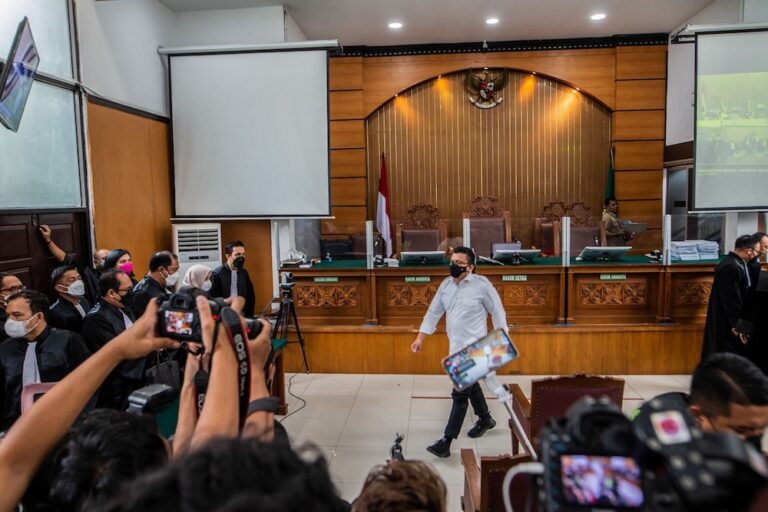(SEAPA/IFEX) – SEAPA is saddened over the deaths of broadcast journalists Suherman, 31, and Muhammad Guntur, 36, who were killed on 25 February 2007, in Jakarta, Indonesia, while covering an investigation into a ferry fire that cost some 50 lives. Both were camerapersons for private broadcasters; Suherman was with Lativi, and Muhammad Guntur with SCTV. […]
(SEAPA/IFEX) – SEAPA is saddened over the deaths of broadcast journalists Suherman, 31, and Muhammad Guntur, 36, who were killed on 25 February 2007, in Jakarta, Indonesia, while covering an investigation into a ferry fire that cost some 50 lives.
Both were camerapersons for private broadcasters; Suherman was with Lativi, and Muhammad Guntur with SCTV. According to the Alliance of Independent Journalists (AJI), the two were among 18 journalists accompanying experts from the National Committee for Transport Safety and Forensic Laboratory Center on board the wrecked ferry when it listed and sank without warning. According to reports, none of the journalists were wearing life vests.
AJI said another journalist, Bima Marzuki, with the private broadcaster RCTI, was hospitalised. Two police personnel and a member of the transport safety committee were also killed.
SEAPA joins AJI, our Indonesian founding member, in expressing our condolences to the bereaved families and colleagues of those who died. In a 26 February 2007 letter, AJI reminded journalists that professional duty should never override personal safety.
“All parties, whether the government or media companies, must always ensure the safety of journalists when assigning them to cover events, particularly in hostile environments,” AJI said.
“(The media management) should provide protection for journalists assigned in hostile environments, equip them with adequate work tools and supply them with the know-how and training on work safety. All these requirements are in line with the International Code of Practice for the Safe Conduct of Journalism set by the International Federation of Journalists (IFJ), a global journalists’ organisation of which AJI is a member,” said the media rights watchdog.
SEAPA would like to stress that journalists’ safety is a crucial issue in current times and fundamental to media freedom, as reflected in the United Nations’ chosen theme for World Press Freedom Day this year – “Press Freedom, Safety of Journalists and Impunity”. While the underlying concern of the theme is the increasing attacks on journalists globally and the impunity that surrounds these violations, all aspects of journalists’ safety – including those that stem from negligence – merit attention as there is no denying their impact on the physical ability of journalists to do their work.
In the case of the ferry tragedy in Indonesia, SEAPA notes with dismay that there may already be a backlash on the media as Setyo Rahardho, the head of the transport safety committee, reportedly said, “journalists will not be allowed to accompany investigators anymore”.
While SEAPA empathises with the Indonesian authorities over the additional loss of lives following an already horrific ferry disaster, we believe that preventive measures could be taken in future to avert such tragedies without resorting to a blanket shutting out of media. Additionally, as AJI pointed out, the issue of journalists’ safety should be impressed upon journalists, their employers and the government, so that no one will take unwarranted risks in the pursuit of news, with the understanding that no story is worth a person’s life, most especially that of the storyteller.


